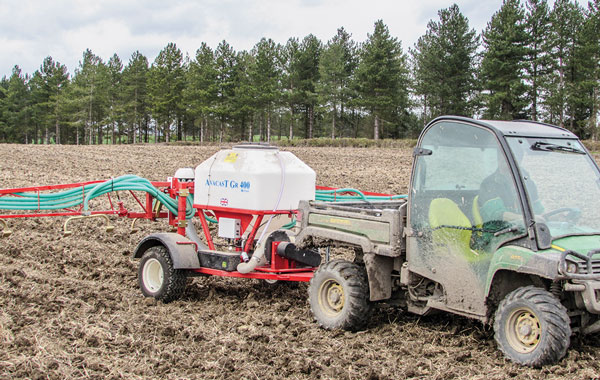An essential start to any black-grass programme
6th September 2019
The use of the residual herbicide Avadex Excel 15G has increased year on year for the past eight years and demand is expected to increase once again this autumn.
The use of the residual herbicide Avadex Excel 15G has increased year on year for the past eight years and demand is expected to increase once again this autumn.
“This is because Avadex (tri-allate) applied pre-emergence is regarded as the essential start to any black-grass programme in cereals,” says Gowan country head for UK and Ireland, Dominic Lamb. “Its use in a programme along with flufenacet-based herbicide can add on average 15 per cent control of this very difficult and competitive grass weed,” he adds.
To get the best from Avadex granules, it is vital that the applicator is calibrated correctly when applying 15kg/ha and that the granules are applied evenly across the boom width. “The correct amount of herbicide granule must be delivered down each pipe and a patternation test carried out along with the calibration. Black-grass is such a competitive weed that accurate and even application is essential,” says Dr Lamb.
This information shows that flufenacet, the foundation for most pre-em programmes, is vulnerable to dry conditions, as is DFF. Prosulfocarb is a little less vulnerable and pendimethalin even less so. The efficacy of tri-allate is the least affected by dry conditions. If conditions are so dry that weed germination is affected, then no residual herbicide is able to give its best.” Herbicide stack Black-grass remains the scourge of most arable farmers and together with cultural control methods, Avadex and flufenacet in the herbicide stack would be the most popular start to its control in winter wheat and winter barley, says Gowan. Avadex granules are approved for use in winter and spring wheat, winter barley and spring barley, with EAMUs for winter rye and triticale, winter and spring linseed, canary grass and Miscanthus.
In a programme it adds to the overall black-grass control as well as having an effect on wild oats, rye-grass and brome species. Avadex also has some effect on key broad-leaved weeds including cleavers, charlock, chickweed, poppy, field pansy, speedwell, forget-me-not, fumitory, mayweeds and red deadnettle.
Dr Lamb urges farmers to book their contractors sooner rather than later. If farmers need any help, Gowan maintains a database of contractors, listed by counties, on its website (www.Avadex.co.uk), he says, adding that “contractors need to be sufficiently tooled up to satisfy the increased demand on their services, and they must be ready to get going this autumn.”


